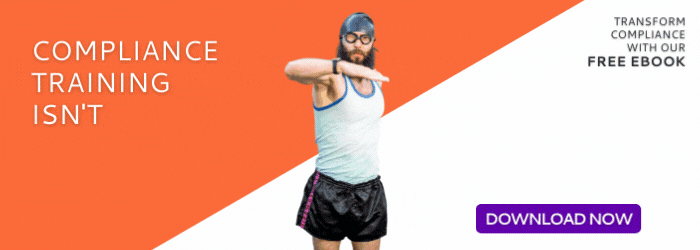Compliance training is a funny old thing. For some reason, us lot in Learning and Development seem to all abide by a barrel load of unspoken rules. Rules which perhaps made sense twenty years ago, but certainly aren’t doing us any favours today. In many cases we don’t even challenge these rules; we just blindly continue to adhere to them, often to the detriment of the training itself. So why are we sticking to the rules when we know they no longer serve us?
These rules are problematic for a modern L&D function. They disengage audiences, increase risk and then cause compliance training to fail. So if we want different results, it’s time to break the rules. Burn the rule book. Start afresh and truly transform training. It’s time to rescind the rules and forget everything you thought you knew about modern compliance training.
So, if you want to evolve your approaches in compliance training, here are the four rules you need to break today.
Rule 1: The subject matter is serious, so the training has to be too
Just because we’re saving lives and supporting a risk minimisation strategy does NOT mean that your course content, delivery method and approach have to be staunch, dry and banal. If reducing risk is your primary goal, then you need to ensure you are getting (and keeping!) your learners’ attention.
And that means saying goodbye to boring training. That means no more 100 slide elearning sessions and it definitely means saying “adios” to tedious, tiring training sessions. Bye-bye, terrible training.
The truth is, somehow we’ve made a strange leap from subject matter to delivery method and it’s done some serious damage to compliance’s reputation. There’s a reason compliance training gets a bad rap – and it’s literally because of this rule.
New Rule: Compliance Can Be Fun (seriously!)
So instead of boring training, consider how you can inject life, flavour and fun into your learning experiences. How can you make the subject matter memorable and accessible to the person when they need it most? Ask yourself: “How can I make my compliance training engaging, interactive and interesting? ”
Rule 2: Compliance training immediately makes people competent
When it comes to reducing risk, this rule is rather risky. Namely, because it’s entirely incorrect and continues to be perpetuated throughout the L&D industry. A common scenario is serving up some mandatory training or elearning. The learner does said training and POOF! they’re compliant. Sure, they’re compliant on paper, but that’s really all you’re going to get from the training if this is the only learning experience you provide.
Single learning experiences do not change behaviour. And that’s because it’s very rare that a single learning intervention is used to solve a complex learning challenge. We know it does not work. So we ask you, why are we letting compliance training fall through the cracks when it’s arguably the most important of all?
New Rule: Blended learning is better
Take a pragmatic approach to your compliance training and combine a diverse range of learning-rich experiences including classroom training, elearning, mentoring, virtual live training, webinars and more. Spread these experiences over a period of time and watch your risk rates rapidly decline.
Rule 3: Completed learning leaves us risk-free
This one sticks around like a bad smell. We know how it’s come about. An organisation has legally mandatory training to deliver to their employees. Their Compliance or Risk Managers rightly need a way to evidence that training has been delivered, just in case they ever get audited. So L&D fixates on the completion, the act of doing the training, and somehow confuses that with knowledge acquisition and application.
Because compliance training is typically measured by attendance or ‘completions’, we’ve started to believe that the completion is evidence that learning took place and indeed that the employee will be able to apply that learning in the workplace.
Hello Captain Obvious. That’s not how learning works. Just because someone clicked through an elearning module, or sat in a classroom for a day, does not mean that they’ve learned something. This is a dangerous place for us to be, particularly when trying to tackle subject matter as significant as resuscitation or first aid.
New Rule: Make space for application
Someone undertaking learning doesn’t ensure learning transfer or indeed guarantee that they are going to be able to recall the knowledge when they need it. So rather than focusing on completions to minimise risk, explore how you can extend your compliance training into a programme that allows opportunities for application on the job and makes use of mentorship and managerial support.
Rule 4: Compliance training makes people confident
Imagine this as a scenario.
You’ve attended a really engaging first aid training course as part of your compliance training at work. You pay attention within the session and feel like the experience was meaningful, memorable and useful. You leave feeling like you know how to deliver CPR to someone should they ever need it.
A few months pass, and one day you’re in the office kitchen. It’s after hours and a handful of people are burning the midnight oil. Suddenly one of your colleagues collapses. You intervene and desperately try to recall what you learned in the classroom. You can recall some of it, but having only ever practised on a dummy three months ago, you don’t feel very confident undertaking CPR. You call an ambulance and wait.
This is a realistic example of how we deliver compliance training at the moment. If we’ve broken rules 1-3, it’s likely that the training your people received was engaging, practical and memorable. So why aren’t they comfortable with applying the skills they learned in the classroom?
Because they aren’t confident in their skills and haven’t ever used them in a real-life example.
New Rule: Regular refreshers are essential
If we want our people to feel comfortable, confident and competent in using their newly acquired skills, we need to ensure those skills remain fresh and front of mind. We also need to make sure that they have chances to explore and execute these skills in as many on-the-job situations as possible.
Explore how you can use virtual experiences, VR or even experiential learning to help support their learning and make sure you are touching base with these skills quarterly so that they have ample opportunities to retain information and apply it.
Turning risk into opportunity
There are so many reasons why our compliance training isn’t effective. But one thing is for sure, breaking the rules above is a sure-fire way to start tackling the rising risk challenge in your organisation and better connect with your people.
So don’t wait to seize the opportunities risk is giving us by taking the biggest risk of all: challenging the status quo. Trust us, your audiences will thank you.






